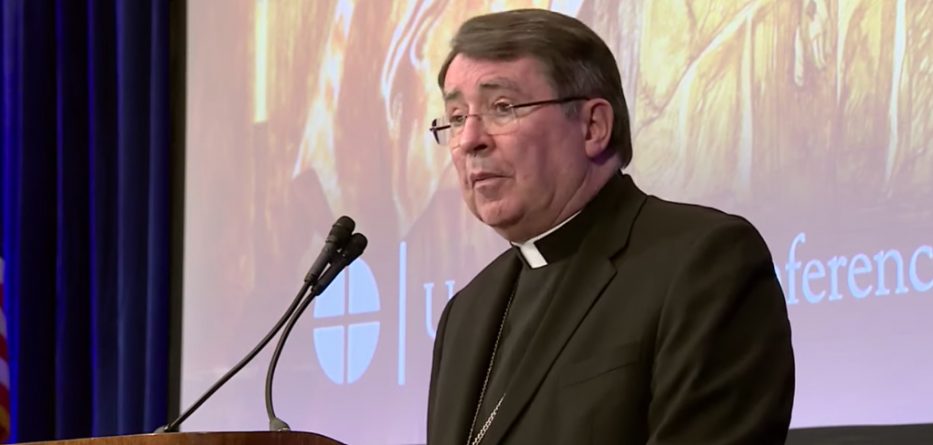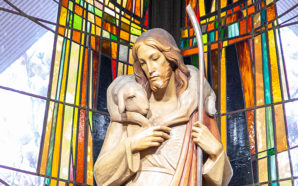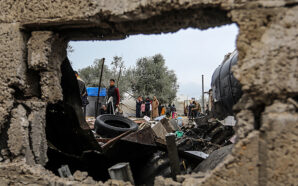Address of His Excellency Archbishop Christophe Pierre
Apostolic Nuncio to the United States of America
USCCB General Assembly, Baltimore, Maryland
November 11, 2019
My Dear Brothers in Christ,
Once more, I am happy to be with you here in Baltimore, and I greet you in the name of Pope Francis, even as you prepare to greet him in person on your Ad Limina visits. I am grateful to His Eminence Cardinal Daniel DiNardo, President of the USCCB, and to Msgr. Bransfield and the staff of the USCCB for the invitation to speak to you. I assure you of the Holy Father’s closeness, prayers, and gratitude for your ministry as you engage in the New Evangelisation.
It is unfortunate that I could not be with you personally last June, but the Holy Father called all the nuncios to Rome and gave us a “Decalogue” of qualities of a nuncio, which forced each of us to examine ourselves, posing difficult questions about our mission and ministries. In late July, I went to Atlanta to address the African Conference of Clergy and Religious in the United States. I thought I would follow Pope Francis’s example and pose questions to these missionary priests and religious working in the United States. Just last month, I went to Orange, California for a gathering of Vietnamese Priests, and I did the same thing. I proposed to them some topics for reflection, and this prompted a lively discussion; the themes were challenging and intended to reawaken a sense of mission. As the ad Limina visits begin, it is also useful to reflect on our sense of mission.
Your Quinquennial Reports provide a clear picture of how the Church in the United States is carrying out its mission. You have many challenges, some of which we have spoken about over our years together: demographic changes; growing numbers of religiously unaffiliated people; the need to engage young people and to build a culture of vocations; welcoming and integration of migrants, especially Hispanics; continuing the fight against all forms of racism; and, defending and accompanying the human family. These are but a few of the challenges.
Although there are challenges, there are also many dedicated Catholics who daily live their faith. The Church in the United States has been strong not only in its defence of human life and religious liberty but also in its defence of the rights of migrants and families. The generosity and willingness of Catholics to sacrifice is witnessed in the charitable works during times of national disasters or through Catholic Relief Services, in addressing global issues of poverty, hunger, healthcare, water and sanitation. The 2015 World Meeting of Families, the Convocation of Catholic Leaders, and the Fifth National Encuentro were all signs of hope for the Church in this country, even as many of us worry about the lasting impact of the sexual abuse crisis. I want to offer you words of encouragement. Christ is with us. He accompanies us, and He is alive – in us and in the People of God.
There is a temptation to look at things only from the perspective of the problems we must face, but there are many initiatives, which fill a bishop with pride – things that you highlighted in your ad Limina reports. Approaching the episcopal office with seriousness, the strategic planning processes in many dioceses show how you are trying to lead your local churches in the mission of evangelisation. You are concerned not only about the present state of the Church but also about its future, recognising the need to be in a permanent state of mission.
Certainly, your reports were very interesting and extremely thorough. The process of preparing them has been a process of discernment for you and your collaborators, and with your visit, your discernment will continue with the Holy Father. He will see the fruits of your discernment and will continue to accompany you. I hope that the process, which involved many of your collaborators, has also given you some new perspective on the state of your diocese and the direction it needs to go. The process creates the opportunity to evaluate and re-evaluate our structures and initiatives and to reform or re-work them for the sake of mission.
As your visits ad Limina Apostolorum approach, allow me to make a few observations, based not only on your reports, which really capture the last seven years in the life of your dioceses, but also based on my travels throughout the country, which have allowed me to be inserted into the life of the Church here, and based on listening to the various groups and apostolates who have come to the Nunciature. I want to pose some points for our common reflection, hoping that they will be of some benefit for each one of us.
Over the past decades, the situation of the Church has evolved and developed in an increasingly secular culture. As often as we speak of the “new evangelisation”, serious reflection is necessary on the outcomes of our efforts. What has been truly effective? Do you feel that we and our collaborators have been far-sighted and proactive in efforts at evangelisation, anticipating cultural, philosophical, and political trends, or do we find ourselves in the position of having to be reactive? Certainly, evangelisation remains a pastoral priority, but do pastoral priorities, which we have chosen, truly touch the reality of the life of our people or do they need to be adjusted or realigned?
Efforts to evangelise and accompaniment to the encounter of each person with Christ are the work of the whole Church and necessarily involve clergy, religious, and laity. Have we adequately engaged them and helped them to truly live their respective vocations fruitfully? As bishops, we must use our authority to shepherd the flock, mindful that our authority is for the service of the flock- to teach, sanctify and govern in the name of Christ. Each of us is invited to reflect on how successful we have been in integrating the necessary contributions of the laity, without abdicating our own responsibilities, including those of teacher and steward, as Shepherds who govern in the name of Christ.
Each of us exercises his own specific episcopal ministry, but we also try to work together in a spirit of collegiality as an episcopal body. What are the strengths of this episcopal body, and how is the body serving the needs of the people entrusted to our pastoral care? The same collegial “working together” pervades the many state Catholic Conferences which address more specific pastoral needs, as well as your gathering as regions. Collegiality is much more about how “to be” than how to “act”.
In September, I travelled to Milwaukee to meet with about ten bishops who were interested in sharing ideas about their ministry. Do you find that you share experiences with brother bishops? It is always edifying to find younger bishops discovering a “mentor” among the more senior bishops or to hear of how “more experienced bishops” have taken the opportunity to share some of their wisdom and experience with younger bishops in a fraternal way. Younger bishops also have something to offer to older bishops; for example, they lead the way in utilising technology to evangelise. From what I witnessed in Milwaukee, I think the bishops gathered really benefited from their collective wisdom.
This “collective wisdom” directs us to another idea – communion. As the ad Limina visits are upon us, it is good to reflect on the ways in which we exercise our communion with the Holy Father and with the wider Church. The Pope has emphasised certain themes: mercy, closeness to the people, discernment accompaniment, a spirit of hospitality toward migrants, and dialogue with those of other cultures and religions. Do you believe that these are gradually becoming part of the mindset of your clergy and people? It is an interesting question to ask, because while there has been a strong emphasis on mercy by the Holy Father, at times, paradoxically, people are becoming more and more judgmental and less willing to forgive, as witnessed by the polarisation gripping this nation.
Communion is also an important factor within local churches. Priests should truly be co-workers with their bishops, but to some extent the current crisis has affected us all. Certainly, it has affected our relationships with our people and even our priests. When we speak of the healing that needs to take place, we are necessarily saying that it should include a commitment to discovering ways and means of establishing communion and trust. This will not be easy and will take time.
Establishing communion within the presbyterate is becoming increasingly challenging, and not just because of differences in age, theology, or liturgical practices. Due to the shortage of priestly and religious vocations, the presence and the service of priests coming from foreign countries has become common in some areas. Although we are grateful for the sacramental and pastoral care provided by these priests, we must investigate how this has affected or is affecting the presbyterate within our respective dioceses. Have you been able to maintain unity among priests or is there a sense of disconnectedness among them? Many priests are saying they no longer know one another; others, due to the priest shortage are forced to live in isolation, managing multiple parishes. Our episcopal ministry demands that we act as bridges for our priests, attentive to their life and health, spiritual well-being and their sense of priestly identity and fraternity.
The clergy shortage poses threats to priestly fraternity and unity and has precipitated strategic and pastoral planning. While recognising the necessity of planning, there remains an urgent need to cultivate priestly and religious vocations across the country. In some areas, there have been successful efforts to build a culture of vocations. What strategies have been effective? Building the culture of vocations also means providing adequate support for and accompaniment of families, where vocations are born and nurtured even at a young age.
Finally, in preparation for the ad Limina visits, it may be useful to prayerfully reflect on the gift of communion with the Bishop of Rome. While we can reflect on this communion in a theological way, we ought to examine it practically, namely by measuring to what extent we as individuals and our local churches have received the Magisterium of Pope Francis. Certainly, many have grappled with Evangelii Gaudium, and the Convocation of Catholic Leaders was a successful venture; by now, Evangelii Gaudium should be the framework for efforts at evangelisation. Adopting its missionary impulse and being in a permanent state of mission might represent tangible signs of communion with the Holy Father, for it would show the reception and implementation of his teaching as the key for missionary evangelisation.
The pastoral thrust of this Pontificate must reach the American people, especially as families continue to demand of dioceses and parishes the accompaniment envisioned by Amoris Laetitia. Other parts of the Magisterium of Pope Francis have been well-received by young people but will require greater effort on our part if they are to reach the hearts of political and civic leaders; here I think about the Holy Father’s message about our common home and the environment, articulated in Laudato Si. In a pluralistic society such as the United States, the emphasis on human fraternity by Pope Francis could serve as a means for deepening the richness of American culture and of creating an openness to the new waves of immigrants who are seeking a brighter future. Our communion with the Holy Father can be expressed in the concrete actions that we take to make his Magisterium better known among our people.
Finally, it would be good to reflect on what is the most life-giving and fulfilling dimension of our ministry, rather than reflecting exclusively on the challenges. The Holy Father would be very interested to learn some Good News about your Diocese. Amid the challenges of the episcopacy in this day and age, the burdens of ministry can easily affect us. A useful practice is to reflect on our enthusiasm when we first received the call informing us of our nomination to the episcopacy and to use that as a measure against our enthusiasm and zeal for our ministry today. Are we still zealous for the things of the Lord? While energy levels may diminish with age, hopefully our love for God and His people has increased, along with our gratitude for the grace of the call.
It is precisely this love and grace that can help renew the Church in the United States, renew its fervour for evangelisation in a changed situation, fulfilling the Holy Father’s dream for a “missionary option” in the Church. The Apostles Peter and Paul were missionaries among the Jews and Gentiles respectively. As you journey to Rome for your visit ad Limina Apostolorum to venerate the tombs of the Apostles and to meet with the Successor of St. Peter, it is my hope that your communion with the Apostolic See, which presides in charity, may be deepened and that your own sense of responsibility as successors of the Apostles, with care for your particular churches, will be strengthened as you discern, with the Holy Father, the path that leads your respective flocks to verdant pastures and restful waters.
My brothers, I hope that you find these reflections useful. Together let us reflect honestly on the ministry of bishops, called to serve the Church in the United States. Knowing the richness of your spiritual and cultural heritage, as well as the depth of your faith and devotion and that of your people, I am confident that the Church in the United States will discover the right path for its spiritual renewal so that it can continue to be the Church that Christ calls it to be. Thank you.
With thanks to the United States Conference of Catholic Bishops.








